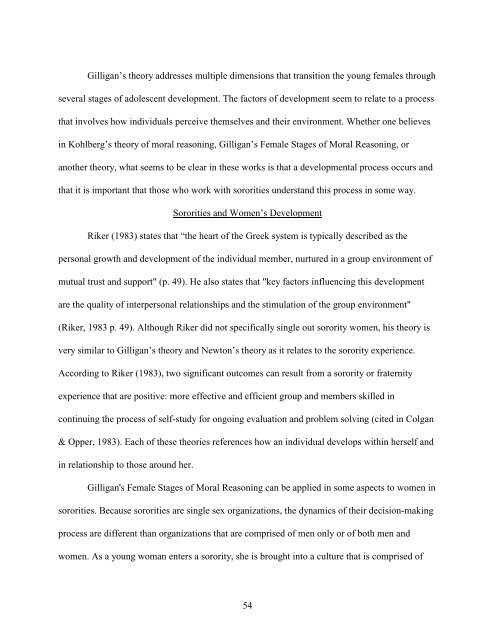Sorority Rituals - Reflections On Rites of ... - Mari Ann Callais
Sorority Rituals - Reflections On Rites of ... - Mari Ann Callais
Sorority Rituals - Reflections On Rites of ... - Mari Ann Callais
Create successful ePaper yourself
Turn your PDF publications into a flip-book with our unique Google optimized e-Paper software.
Gilligan’s theory addresses multiple dimensions that transition the young females through<br />
several stages <strong>of</strong> adolescent development. The factors <strong>of</strong> development seem to relate to a process<br />
that involves how individuals perceive themselves and their environment. Whether one believes<br />
in Kohlberg’s theory <strong>of</strong> moral reasoning, Gilligan’s Female Stages <strong>of</strong> Moral Reasoning, or<br />
another theory, what seems to be clear in these works is that a developmental process occurs and<br />
that it is important that those who work with sororities understand this process in some way.<br />
Sororities and Women’s Development<br />
Riker (1983) states that “the heart <strong>of</strong> the Greek system is typically described as the<br />
personal growth and development <strong>of</strong> the individual member, nurtured in a group environment <strong>of</strong><br />
mutual trust and support" (p. 49). He also states that "key factors influencing this development<br />
are the quality <strong>of</strong> interpersonal relationships and the stimulation <strong>of</strong> the group environment"<br />
(Riker, 1983 p. 49). Although Riker did not specifically single out sorority women, his theory is<br />
very similar to Gilligan’s theory and Newton’s theory as it relates to the sorority experience.<br />
According to Riker (1983), two significant outcomes can result from a sorority or fraternity<br />
experience that are positive: more effective and efficient group and members skilled in<br />
continuing the process <strong>of</strong> self-study for ongoing evaluation and problem solving (cited in Colgan<br />
& Opper, 1983). Each <strong>of</strong> these theories references how an individual develops within herself and<br />
in relationship to those around her.<br />
Gilligan's Female Stages <strong>of</strong> Moral Reasoning can be applied in some aspects to women in<br />
sororities. Because sororities are single sex organizations, the dynamics <strong>of</strong> their decision-making<br />
process are different than organizations that are comprised <strong>of</strong> men only or <strong>of</strong> both men and<br />
women. As a young woman enters a sorority, she is brought into a culture that is comprised <strong>of</strong><br />
54



